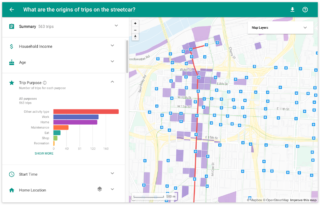
A powerful new data collection tool has local transportation agencies salivating.
Replica by Sidewalk Labs (owned by Alphabet, the company that owns Google) bills itself as a “next-generation urban planning tool.” Using location data gleaned from cell phones and other sources, Replica creates a “synthetic population” based on aggregate U.S. Census data. The promise of this tool is that it can give planners and engineers unprecedented insights into the traffic patterns and mobility behaviors of urban residents.
From regional trends to fine-grain analysis of travel to-and-from specific destinations, this data has vast potential. But it also requires trust from a wary public fearful of privacy breaches and government/corporate overreach.
At this morning’s Portland City Council meeting, the Portland Bureau of Transportation urged Mayor Ted Wheeler and his colleagues to approve an intergovernmental agreement (PDF) between PBOT, Metro and TriMet that would enable the agencies to enter into a 12-month pilot with Sidewalk Labs. Here’s more from the official city ordinance under consideration:
“The more information we have about how, when, and why our streets being used, the better we are able to plan for and accommodate those demands and make our city work better for everyone.”
— Chloe Eudaly, city commissioner
“Sidewalk Labs is seeking metropolitan regions to pilot test Replica, a data tool developed by Sidewalk Labs, a subsidiary of Alphabet, Google’s parent company, that provides a high-fidelity, synthetic representation of how people travel during a typical week… As designed, Replica is capable of providing the City of Portland with rich data pertaining to transportation supply (the configuration of the roadway network, transit service, bicycle routes, and footpaths), transportation demand (representations of all personal travel that takes place in the region), land use (estimates of how land is used, for example, estimates of spatially-specific employment and school enrollment estimates as well as spatially and temporally-specific estimates of other activities, e.g., shop, eat, recreate), and demographics (including income, race, and household size). This data is not currently available to PBOT at the volume, depth, or frequency that the Replica tool is able to provide; and, access to this data, once validated, has the potential to greatly enhance PBOT’s ability to understand how people are moving through our transportation system as well as if and how investments in this system ultimately impact mobility and motivate transportation choices.”
PBOT Commissioner Chloe Eudaly said she’s “very excited” about the project. “The more information we have about how, when, and why our streets being used, the better we are able to plan for and accommodate those demands and make our city work better for everyone.”
Eudaly addressed the privacy issue by saying all the information (before it even reaches Sidewalk Labs) would be “de-identified.” “This is not about tracking individuals,” she assured council prior to the staff presentation.
Advertisement

Replica promo video by Sidewalk Labs
“This tool can fundamentally change the game for us.”
— PBOT
The PBOT staffer who pitched the concept to City Council said the data provided by Replica would be “core to the work we do.” The idea is being sold as a way to measure whether current transportation investments are working, or whether or not future investments would result in desired outcomes. If Sidewalk Labs can meet the City’s privacy regulations, the PBOT staffer said Replica could be, “game-changing.” “Today we do it via surveys and hand-counts. It’s expensive and labor intensive,” he shared. “This tool can fundamentally change the game for us.”
The 12-month pilot would cost $457,300 (based on total population if the Portland metro area at a cost of 20 cents person), which would be split three ways by PBOT, Metro and TriMet.
It might seem like a slam-dunk decision for Council, but privacy concerns are sure to take center stage. Three members of the public testified at this morning’s hearing with strong opposition to the idea. Between now and the second reading of the ordinance where a vote could happen, Mayor Wheeler and others might look to Toronto where Sidwalks Labs is in the middle of a major debate over how their Replica tool will be used to plan an entire neighborhood.
Portland isn’t new to the big data/urban planning space. PBOT already has a contract with local firm Ride Report that offers a data dashboard showing bike counts and bike/scooter share locations. And in 2016, PBOT pitched then US DOT Secretary Anthony Foxx on their “Ubiquitous Mobility” concept that was a finalist for a major “smart city” prize (which we ultimately lost to Columbus, Ohio).
Margi Bradway, a former staffer at the Oregon Department of Transportation who brokered a deal to use GPS data from Strava, a popular cycling app, brought her love of data to PBOT when she was hired to lead their Active Transportation Division in 2014. Bradway now works at Metro where she’s deputy director of transportation planning. Metro will be the lead agency on the Replica project if and when it’s approved by Portland City Council.
Learn more about Replica here and stay tuned for its next hearing.
UPDATE, 12/13: City Council passed the ordinance yesterday. Here’s a report from OPB.
— Jonathan Maus: (503) 706-8804, @jonathan_maus on Twitter and jonathan@bikeportland.org
Never miss a story. Sign-up for the daily BP Headlines email.
BikePortland needs your support.

